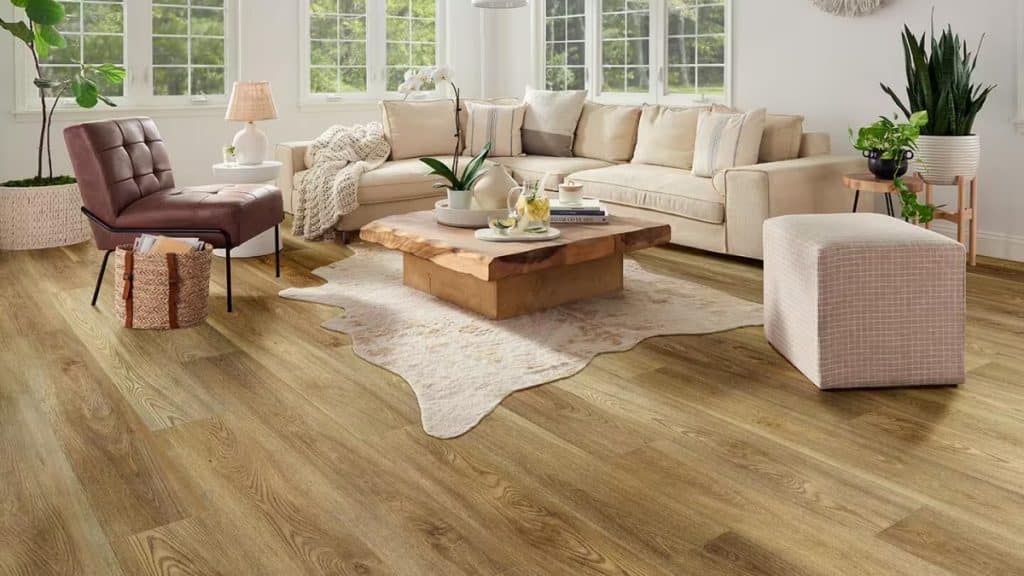Probably one of the most important decisions that a person needs to make in an interior design project is choosing the correct flooring for your house. The choice of flooring determines the overall ambience of the house. With many options from natural wood to tiles and epoxy flooring, one may get overwhelmed in deciding which to choose for the home. In this blog, we will break down the key factors to consider and explore the pros and cons of popular flooring materials.
Understand your needs and lifestyle
Everyone has different tastes and preferences and the same is the case for the lifestyle people choose. Here are a few factors to consider before choosing the best flooring material:
- Foot traffic: Every house has certain areas like the hallway, kitchen, and living room which are more used and see a lot of foot traffic. While areas like bathrooms receive lesser foot traffic comparatively.
- Pets and children: With pets and children in the house, you will need durable, scratch-resistant flooring option which is also easy to clean.
- Budget: One of the most important factors to consider before choosing a flooring material is the kind of money you are willing to spend. In today’s world, there are a ton of material options with varying costs.
What are the different material options to choose from?
Hardwood flooring
You can choose hardwood flooring for a timeless elegance. Being made of natural wood, hardwood flooring brings a sense of calm, elegance, and natural beauty into your home. Hardwood flooring comes with a few pros and cons.
Pros:
- Hardwood flooring, made of natural wood, is durable. Good quality hardwood may even last for decades if maintained properly.
- The natural aesthetic of real wood adds character to any room.
- There are various species of hardwoods like oak, Sheesham, and walnut. Each of these offers a unique look.
- Hardwood flooring is loved by homebuyers. This means it will also increase the resale value of your house.
Cons:
- Hardwood flooring is usually very expensive
- It is not easy to maintain hardwood as it is not scratch-resistant hence it requires frequent polishing.
- Hardwood flooring is not ideal for damp areas like bathrooms as the moisture can ruin the wood and make it swell up.
Laminate flooring
Laminate flooring is a cheaper alternative to hardwood. It is ideal for people who want the aesthetics of wood or stone but at a pocket-friendly price. Laminate flooring is easy to install so there is always a scope to DIY.
Pros:
- Laminate mimics the look of wood or stone but at a fraction of the cost.
- Scratch-resistance, stain resistance, and anti-fading properties make it ideal to be used in high foot-traffic areas.
- Laminate flooring is very easy to install and doesn’t usually require professional fitting. They come in easy-to-install planks which snap together in no time.
Cons:
- Laminates, just like hardwood are not moisture-resistant. If the laminate is exposed to moisture for a prolonged time, it can swell up and get damaged.
- Unlike hardwood, laminate can not be polished or refinished, which means it can only be replaced if damaged.
- While laminate can greatly mimic the aesthetics of hardwood, it still doesn’t give the authentic feel of wood underfoot.
Tile flooring
Tile flooring has always been very popular among homeowners. There are a number of types of floor tiles like ceramic and porcelain. Each offers different benefits. Tile flooring is ideal for moisture-prone areas like bathrooms and kitchens.
Pros:
- Tile made of durable porcelain or ceramic is water resistant. With new features like anti-skid, they become an ideal choice for wet areas.
- Ceramic and porcelain tiles are highly durable, scratch-resistant, and stain-proof.
- There is a huge variety of colours and textures to choose from which means there is always something for everybody.
Cons:
- Floor tiles are not an ideal option for homes in colder regions as they make the homes even colder.
- Floor tiling usually requires professional installation which means you can end up paying a huge amount for the installation.
- The grout lines in between the tiles are known to accumulate dirt and show stains and hence require regular cleaning and sealing.
Epoxy flooring
Epoxy flooring is gaining popularity as a sleek and durable flooring option. The modern and classy look is suitable for both residential and commercial settings and the versatility is what most people prefer.
Pros:
- Epoxy flooring is highly durable making it suitable for high-traffic places like industrial areas, garages, and parking lots.
- It requires very little maintenance and hence is very easy to upkeep.
- It has a seamless appearance and adds a modern and sleek aesthetic to any space.
- It is water-resistant making it ideal for bathrooms.
- Various customizations are possible like metallic effects among other creative design possibilities.
Cons:
- Like floor tiles, epoxy flooring also feels cold to walk barefoot on which is not a comfortable experience.
- The glossy, smooth surface becomes slippery when wet but this can easily be solved with anti-skid coatings.
- The installation is a time-consuming process as multiple layers are laid.
When choosing the best flooring material for your home, you should consider how much you are willing to spend, what your lifestyle is, which region you live in, and the specific needs of the rooms. Each flooring material has its own advantages and disadvantages. Upon carefully analyzing these aspects you can make an informed decision that not only suits your taste but also is functional for you.
